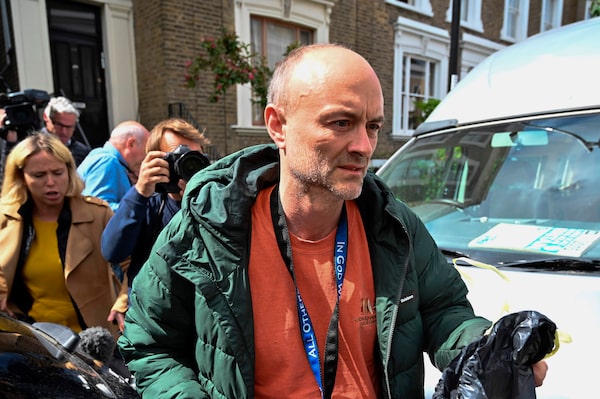
Number 10 Downing Street special advisor Dominic Cummings leaves his home in London on May 24, 2020 following allegations he broke coronavirus lockdown rules by travelling across the country in March.GLYN KIRK/AFP/Getty Images
Prime Minister Boris Johnson said Sunday he wouldn’t fire his chief aide for allegedly violating the national coronavirus lockdown rules that he helped to create.
Mr. Johnson defied a growing clamour for the dismissal of adviser Dominic Cummings, who drove 250 miles (400 kilometres) from London to his parents’ home in Durham, in northeast England, with his wife and son as he was coming down with COVID-19 at the end of March.
Britain’s lockdown, which began March 23, stipulated that people should remain at their primary residence, leaving only for essential local errands and exercise. Anyone with coronavirus symptoms was told to completely isolate themselves.
Mr. Cummings says he travelled to be near extended family because his wife was showing COVID-19 symptoms, he correctly thought he was also infected and he wanted to ensure that his four-year-old son was looked after.
Mr. Johnson said he had held “extensive” conversations with Mr. Cummings and concluded he acted “responsibly, legally and with integrity.”
He told a news conference that said Mr. Cummings “followed the instincts of every father and every parent.”
But several lawmakers from Mr. Johnson’s Conservative Party joined the opposition in calling for Mr. Cummings to go.
“Dominic Cummings has a track record of believing that the rules don’t apply to him and treating the scrutiny that should come to anyone in a position of authority with contempt,” tweeted Conservative lawmaker Damian Collins. “The government would be better without him.”
Another Tory legislator, Steve Baker, said Mr. Cummings must resign for not “abiding by the spirit, at least, of the slogans which he has enforced on the rest of the country.”
“It is very clear that Dominic travelled when everybody else understood Dominic’s slogans to mean ‘stay at home, protect the (health service) and save lives,’” Mr. Baker told Sky News.
The coronavirus cut a swath through the top ranks of Britain’s government in March and April, infecting people including Mr. Cummings, Health Secretary Matt Hancock and Mr. Johnson himself, who has said that the medical staff at a London hospital saved his life.
Critics of the government expressed outrage that Mr. Cummings had broken strict rules that for two months have prevented Britons from visiting elderly relatives, comforting dying friends or even attending the funerals of loved ones. The opposition Labour Party has called for an official investigation.
Former Labour lawmaker Helen Goodman, whose father died in a nursing home during the outbreak, said Mr. Cummings’ behaviour was “repellent.”
“What was the point of the sacrifice that we all made? What was the point of the miserable, lonely death that my father had?” she told the BBC.
Mr. Cummings is a key but contentious figure in Mr. Johnson’s administration. A self-styled political disrupter who disdains the media and civil service, he was one of the architects of the successful campaign to take Britain out of the European Union, and orchestrated the Conservatives’ decisive election victory in December.
Government ministers defended him as a father concerned for the welfare of his child who travelled to be near his family but self-isolated in a separate building, away from his elderly parents.
“The most important thing is that Mr. Cummings and his family remained locked down” for 14 days once they arrived in Durham, said Transport Secretary Grant Shapps, who added that Mr. Cummings wouldn’t resign.
Mr. Shapps denied a second claim that Mr. Cummings was spotted again in Durham on April 19, after he had recovered from the virus and returned to work in London. But he said he didn’t know the truth of a report in Sunday newspapers that Mr. Cummings had visited a scenic area 30 miles (50 kilometres) from Durham on April 12.
Mr. Johnson’s government is already facing criticism for its response to a pandemic that has hit Britain harder than any other European country. Britain’s official coronavirus death toll stands at 36,675, the second-highest confirmed total in the world after the United States. Statistics that include suspected as well as confirmed virus cases put the toll at more than 40,000.
The U.K. is gradually easing its lockdown, allowing more outdoor recreation and letting some shops and businesses reopen. The government hopes primary schools can start reopening in June, though many parents and teachers worry that it isn’t yet safe to do so.
Mr. Cummings is one of several senior U.K. officials to be accused of flouting the lockdown rules.
Epidemiologist Neil Ferguson stepped down as government scientific adviser earlier this month after a newspaper disclosed that his girlfriend had crossed London to stay with him during the lockdown. In April, Catherine Calderwood resigned as Scotland’s chief medical officer after twice travelling from Edinburgh to her second home.
Our Morning Update and Evening Update newsletters are written by Globe editors, giving you a concise summary of the day’s most important headlines. Sign up today.